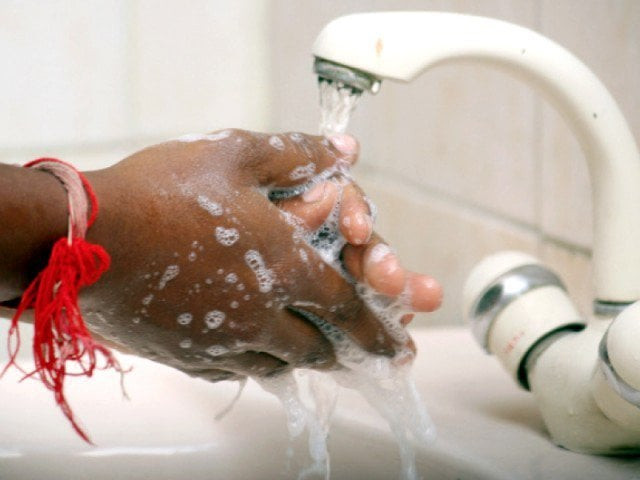Global Handwashing Day: Experts call for integrated efforts to improve ‘WASH’ sector
Around 40 per cent of population does not regularly use soap .

Around 40 per cent of population does not regularly use soap . PHOTO: ATHAR KHAN/EXPRESS
Prevention is better than cure, and washing hands with soap is better than medicating one’s self after getting an easily preventable disease.
As Pakistan observes Global Handwashing Day on Thursday (today), around 40 per cent of country’s population, especially in rural areas, remain unaware of the importance of clean hands, with experts calling for integrated efforts to improve water, sanitation and hygiene (WASH) for a healthy population.

While speaking on Wednesday at an event organised by WaterAid in collaboration with UNICEF, Plan International and the Ministry of Climate Change, experts said that millions of people in the country don’t have access to clean water or soap. These shortcomings contribute to the spread of many preventable water-borne diseases.
They said that Pakistan has a water policy, but it doesn’t differentiate between unsafe and safe water, which is a standard in many countries. The issue needs to be addressed if we want a healthy populace, they added.
According to statistics shared by health experts, around 90 per cent people in the country use water ‘as is’ because notions of boiling or treating water remain rare.
Economic implications
According to slides and research findings shared by experts, poor WASH behaviours have strong economic implications, as Rs343.7 billion, or 3.94 per cent of GDP, is spent on health and treatment of citizens every year, with poor hygiene and sanitation practices being major contributors to disease occurrence.
Child health issues
Children, particularly those younger than five-years old — have vulnerable immune systems. Around 100 children die of diseases caused by poor hygienic practices, with diarrhoea being the second-most common cause of death among children in Pakistan.
Experts said that deaths could be reduced by improving the quality of water and sanitation and by washing hands with soap.
Shifa International Hospital Consultant pediatrician Dr Ejaz Ahmed Khan said that washing hands with soap was the cheapest and most effective way to avoid viral diseases such as seasonal flu and the common cold.

“Around 5,000 children under the age of five die from diarrheal diseases every year in the country due to poor sanitation and hygiene practices,” he said.
Pims Children’s Hospital head pediatrician Dr Tabish Hazir said that washing hands with soap could have prevented almost 40 per cent of the deaths of children under five.
He said that around 19 per cent of child deaths were caused by pneumonia, 14 per cent by diarrhoea, and 11 per cent by other infectious diseases, many of which could easily be prevented by improving sanitation and hygiene.
“Mothers in rural areas rarely wash their hands with soap. There is a dire need to create awareness among mothers about the importance of washing hands with soap before feeding their children and after cleaning them,” he said.
Unicef WASH section Chief Tim Grieve said that there were millions of people in Pakistan who don’t have access to safe water, latrines, or soap.
Published in The Express Tribune, October 15th, 2015.



















COMMENTS
Comments are moderated and generally will be posted if they are on-topic and not abusive.
For more information, please see our Comments FAQ